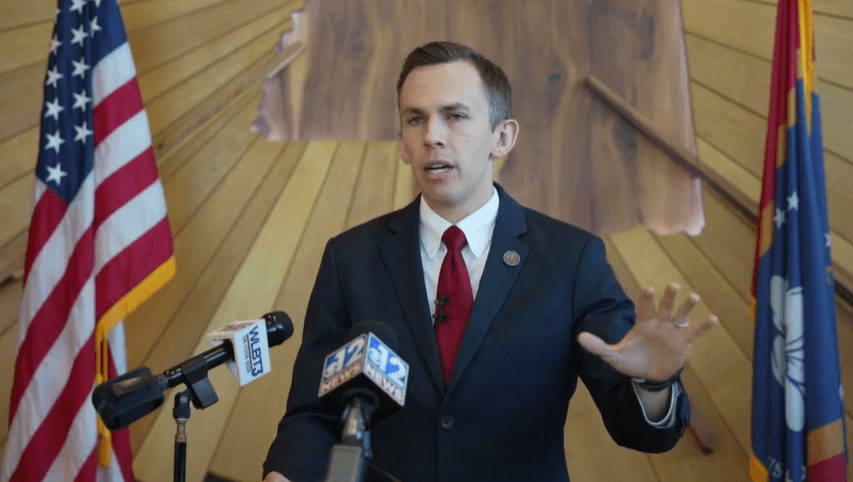
State Auditor Shad White, October 28, 2024 (Photo from press conference livestream)
- Auditor Shad White says his office’s audit report is a roadmap for a leaner, more modern state government that saves money.
An interagency effort supported by Governor Tate Reeves (R) has identified 31 agency-specific and several other cross-agency opportunities that could result in over $335 million in fiscal savings for Mississippi taxpayers, State Auditor Shad White (R) revealed on Monday morning.
White, speaking at the Trade Mart in Jackson, released “Project Momentum,” a report he said is a roadmap to improving Mississippi government’s efficiency by eliminating unneeded services, expanding the capabilities of state employees, and capitalizing on the state’s progress by providing clear value to taxpayers.
“We pulled in a team of national experts who had helped other states reform state agency. So, states like Texas, North Carolina,” White said. “Our goal was to audit financial documents, interview government employees, look at best practices from other states, and again wanted to make recommendations for 13 different state agencies.”
The state agencies reviewed in the report include:
- Department of Education
- Department of Medicaid
- Department of Corrections
- Department of Public Safety
- Department of Revenue
- Department of Finance and Administration
- Child Protection Services
- Department of Environmental Quality
- Department of Human Services
- Department of Wildlife, Fisheries and Parks
- Mississippi Development Authority
- Mississippi Emergency Management Agency
- Department of Employment Security
“Most of those [agencies] report to the Governor. The Department of Education does not report to the Governor, but we included it because it’s such a massive agency and spends such a large amount of taxpayer funds,” White said, adding that their thought with the report was, “If we’re going to go looking for waste, let’s look in the biggest buckets of money.”
With Governor Reeves being a fiscal conservative, White said, “If we look at the agencies that are under the Governor’s control, these recommendations are more likely to be adopted. They are more likely to be taken seriously and changes are more likely to happen.”
Reeves and his appointed agency heads were fully cooperative in the report.
Auditor White and his team focused on “identifying fat,” recurring waste in government as well as where technology could be used to eliminate unnecessary functions. He said a large part of that was found in procurement practices, from toilet paper to state vehicles.
Some of the savings White highlighted included sharing negotiated IT contracts, reducing state office buildings with unused space, trimming top-heavy agencies with too many employees, cutting administrative costs in K-12 schools, and selling the state plane. Auditor White also mentioned that Mississippi state government spends more on insurance on state properties than even the state of Florida.
“We did a detailed analysis of the inefficiencies so we could point to specific contracts that state government has entered into that are inefficient,” White said. “We propose clear action steps for the agency heads with detailed conversations with them, one on one, telling what they could do to help achieve these savings.”
The Auditor’s report offered recommendations that, if implemented, could potentially save $229-$338 million annually, or 4 to 6 percent of the agencies’ current budgets.
“I think this is a roadmap for a leaner, more modern state government that saves money,” White said, adding that the Auditor’s office was long overdue to do an analysis like this.
The last such performance audit, White said, was done under former State Auditor Steve Patterson (D) in the 1990s. Patterson served between 1992 and 1996.
The Auditor did note that his office found no “criminal findings” but did find inefficiences.
“What you see, when you’re talking about inefficiency in government is sometimes you’ll see a government employee who is spending other people’s money and they’re acting like it, they’re not being particularly frugal with it, or you’ll see a lobbyist who comes in and they convince a lawmaker or state agency head, “Hey, you really need this product right here,” and then it gets done. So, those are the kinds of things that are not criminal, but they are worth pointing out because it does generate waste.”
The Auditor hopes the report leads to savings of taxpayer dollars that can be used for high priority state government needs, such as construction and maintenance of roads and bridges and teacher pay.
You can review the full report below and watch the Auditor’s press conference from Monday morning here.









